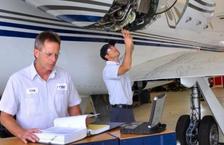Aviation inspectors oversee the implementation of safety procedures and regulations in repair and maintenance of aircraft. You work will involve a lot of interaction with professionals working on the aircraft both on air and in the ground. You will also have a great deal of office work preparing inspection documents.
Here is what you need to do in order to become an aviation inspector.
What does an aviation inspector do?
Your job description as an aviation inspector will be as follows:
- Inspect an aircraft’s navigational aids, communication equipment and air traffic controls and supervise maintenance procedures
- Ascertain an aircraft gets the necessary repairs
- Verify the competency of people working on the maintenance of aircraft
- Vet an aircraft’s airworthiness and issue or deny a certificate depending on the findings
- Develop and enforce aircraft safety standards and regulations
- Evaluate the operation and running of aircraft by their owners to ascertain they adhere to operation and maintenance safety regulations
- Prepare and maintain aircraft repair and inspection records
Qualifications
To kick-start a career as an aviation inspector, you must fulfill specific requirements:
- A 2 and/or 4 year degree in avionics, aviation technology or aviation maintenance
- A certificate from a Federal Aviation Administration, FAA, approved program
- A minimum of 1900 hours of course work in an FAA approved program
- An FAA aviation inspector’s authorization after 24 months experience on the job or an Airframe and Power plant mechanic’s certification with a minimum experience of three years
Skills
Some of the skills to help you pursue a successful career as an aviation inspector include:
- Quality analysis skills
- Keen observation with attention to detail
- Ability to make decisions fast and solve complex problems
- Ability to give and follow instructions clearly
- Extensive knowledge in aircraft operation and maintenance
- Ability to work under pressure within strict timelines
- Strong ethical principles
- An interest in mathematics and avionics
- Proper oral and written communication skills
- A deep comprehension of laws that govern handling and maintenance of aircraft
Work environment
You will spend most of your time in an airport setting. You will have to work shifts sometimes into the weekend or on holiday’s as aircraft operate round the clock.
Often times, your work environment will be noisy because of aircraft engines and different equipment running at the same time. You must also remain physically fit as this aviation job involves a lot of movement and sometimes heavy lifting. You also work on your feet a lot.
A career as an aircraft inspector exposes you to noise, which can gradually affect your hearing. Ensure you receive regular checkups from an ENT specialist to avoid losing your hearing. The environment is also highly polluted. Always wear protective clothing to avoid injury.
Salary
|
Entry Level |
$62,244 |
|
Middle Level |
$77,581 |
|
Senior level |
$108,941 |
Source: Salary: Flight Inspector Salaries
Career prospects
An entry level position qualifies you to work as a mechanic after which you can apply for an FAA certification as an inspector. Originally, you will work on small aircraft and graduate to bigger aircraft. With experience, you can work as a general inspector.
Often times you will work with different airlines. However, you can advance your career to advise regulatory bodies on aviation safety regulation. Alternatively, you can enroll for a graduate program and work in the training of aviation mechanics and inspectors.
If you find aircrafts intriguing and are curious about the mechanical aspects that influence an aircraft’s operation, you should consider a career as an aviation inspector.

